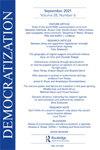利用专家建立政治信任:危机时期的不同意见和批评公民
IF 2.9
1区 社会学
Q1 POLITICAL SCIENCE
引用次数: 0
摘要
根据COVID-19紧急法令,各国实施了卫生专家认可的限制自由措施,以控制疾病。人们一直在争论,这场大流行病是否导致了民主标准的倒退,并助长了不自由和专制的做法。该研究在非民主国家香港进行了一项调查。在新冠肺炎疫情最严重的时候,政府推迟了人们普遍预计反对派会赢得的选举。本研究探讨健康专家的意见是否会影响公众对推迟定期选举的支持和政府的可信度。研究发现,卫生专家的肯定和否定都没有增加对推迟的支持,但拒绝政府授权会降低政府的可信度,而肯定不会。因此,在一个已知的审查环境中,负面意见与肯定意见具有不对称的信息价值。这个渠道是通过香港的民主人士运作的,他们是对该政权持批评态度的公民。压制异议的策略对于维护政治信任来说是具有成本效益的,而让专家来支持任务似乎是无益的。本研究有助于理解专家在威权环境下影响政治信任的作用。本文章由计算机程序翻译,如有差异,请以英文原文为准。
The use of experts in building political trust: dissenting opinions and critical citizens in times of crisis
ABSTRACT Under COVID-19 emergency decrees, countries imposed freedom-restricting measures that health experts endorsed to contain the disease. There has been debates about whether the pandemic has led to the backsliding of democratic standards and the promotion of illiberal and authoritarian practices. This study conducted a survey in Hong Kong, a non-democracy. At the height of the COVID-19 pandemic, the government postponed an election widely expected to be won by the opposition. This study explores whether health experts’ opinions could affect public support for postponement of a regular election and government trustworthiness. It finds that neither health experts’ affirmation nor negation increased support for the postponement, but rejecting the government mandate reduced government trustworthiness while affirming it did not. The negative opinions thus had asymmetric information value against affirmative opinions in a known-censored environment. This channel operates through democrats in Hong Kong, who are critical citizens of the regime. The strategy of silencing dissent would be cost-effective for preserving political trust while engaging experts to support the mandates appeared unhelpful. This study contributes to understanding the use of experts in influencing political trust within an authoritarian setting.
求助全文
通过发布文献求助,成功后即可免费获取论文全文。
去求助
来源期刊

Democratization
POLITICAL SCIENCE-
CiteScore
6.40
自引率
12.50%
发文量
73
期刊介绍:
Democratization aims to promote a better understanding of democratization - defined as the way democratic norms, institutions and practices evolve and are disseminated both within and across national and cultural boundaries. While the focus is on democratization viewed as a process, the journal also builds on the enduring interest in democracy itself and its analysis. The emphasis is contemporary and the approach comparative, with the publication of scholarly contributions about those areas where democratization is currently attracting considerable attention world-wide.
 求助内容:
求助内容: 应助结果提醒方式:
应助结果提醒方式:


